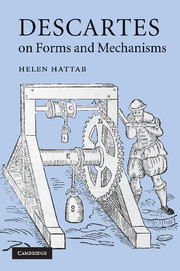Book contents
- Frontmatter
- Contents
- Acknowledgments
- List of abbreviations
- Introduction
- PART I RESURRECTING THE SUBSTANTIAL FORM
- 1 Descartes' arguments against the substantial form
- 2 Aquinas' introduction of the substantial form
- 3 Suarez's defense of the substantial form
- PART II CHALLENGING THE SUBSTANTIAL FORM
- PART III ELIMINATING SUBSTANTIAL FORMS
- Works cited
- Index
3 - Suarez's defense of the substantial form
Published online by Cambridge University Press: 15 September 2009
- Frontmatter
- Contents
- Acknowledgments
- List of abbreviations
- Introduction
- PART I RESURRECTING THE SUBSTANTIAL FORM
- 1 Descartes' arguments against the substantial form
- 2 Aquinas' introduction of the substantial form
- 3 Suarez's defense of the substantial form
- PART II CHALLENGING THE SUBSTANTIAL FORM
- PART III ELIMINATING SUBSTANTIAL FORMS
- Works cited
- Index
Summary
Suarez places key elements of Aquinas' account of the substantial form, most notably his view that the immortal soul is both the form of the human body and a subsisting thing, on center stage and develops them. However, he also diverges significantly from Aquinas' arguments when he pries apart several concepts that, for Aquinas, are closely bound together. Suarez explicitly develops these distinctions in response to refinements and criticisms introduced by later Scholastic discussions of the substantial form. However, as I will argue in the next chapter, Suarez's explicit replies to criticisms that arose within the Scholastic tradition itself can also be seen as an implicit response to the devastating attack that had just been leveled against Scholastic philosophy by Renaissance humanists. Faced with the intellectual and political turmoil of a modern world, to many European universities, Protestant and Catholic alike, Suarez's innovative works provided a major resource for a revamped Aristotelianism that could meet the threat of skeptical humanism and other destabilizing intellectual movements. I will say more about the relationship between intellectual controversies in the Netherlands and Descartes' intellectual trajectory in Part III. For now, I limit myself to a discussion of Suarez's key arguments regarding material substantial forms and their relevance to Descartes' a priori argument against them.
- Type
- Chapter
- Information
- Descartes on Forms and Mechanisms , pp. 40 - 64Publisher: Cambridge University PressPrint publication year: 2009



